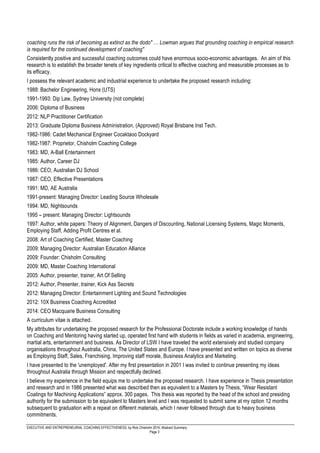The document discusses executive and entrepreneurial coaching effectiveness. It notes that while coaching has become popular, there is little empirical research measuring its effectiveness. The author aims to develop a model to better quantify coaching outcomes and calibrate perspectives between coaches and coachees. Further research is needed to understand factors like the coaching relationship and interpersonal fit that influence outcomes. The author has extensive coaching experience and believes their research could significantly advance understanding of what makes coaching effective.



![EXECUTIVE AND ENTREPRENEURIAL COACHING EFFECTIVENESS, by Rick Chisholm 2014, Abstract Summary
Page 4
I have a particular interest in the field of Coaching and its effectiveness. I have been a coach on many levels in different
areas. I am an active executive coach. I believe that my contribution to the subject will be substantial and have direct
international application, and, potentially revolutionise executive and Entrepreneurial coaching.
References:
Armstrong, H. B., Mesler, P. J., & Tooth, J. (2007). Executive Coaching Effectiveness - a pathway to self - efficacy. Sydney:
Institute of Executive Coaching, .
Berglas, S. (2002). The very real dangers of executive coaching. Harvard Business Review, 80(6), 86.
Blackman, Anna Claire (2007) The effectiveness of business coaching: an empirical analysis of the factors that contribute to
successful outcomes.
Bluckert, P. (2005a). Critical factors in executive coaching - the coaching relationship. Industrial & Commercial Training,
37 (6/7), 336-340.
Bluckert, P. (2005b). The foundations of a psychological approach to executive coaching. [Article]. Industrial & Commercial
Training, 37 (4), 171 - 178.
Brotman, L., Liberi, W., & Wasylyshyn, K. (1998). Executive coaching: The need for standards of competence. Consulting
Psychology Journal: Practice and Research, 50(1), 41.
De Haan, E. (2008a) I doubt therefore I coach - Critical moments in coaching practice, Consulting Psychology Journal:
Practice and Research, 60 (1), 91 - 105
De Haan, E. (2008b) I struggle and emerge - Critical moments of experienced coaches, Consulting Psychology Journal:
Practice and Research, 60(1), 106 – 131.
De Meuse, K. and Dai, G. (2009). Does Executive Coaching Work.: A Meta analysis study.
Feldman, D. C., & Lankau, M. J. (2005). Executive Coaching: A Review and Agenda for Future Research. Journal of
Management, 31(6), 829-848.
Fillery-Travis, A – (2011). A critical review of executive coaching research: A decade of progress and what’s to come.
Fillery-Travis, A. & Lane, D. (2006). Does coaching work or are we asking the wrong questions? International Coaching
Psychology Review, 1(1), 23-36.
Fulmer, R., Gibbs, P., & Goldsmith, M. (2000). Developing Leaders: How winning companies keep on winning. Sloan
Management Review, 42(1), 49.
Grant, A., & Zackon, R. (2004). Executive, workplace and life coaching: Findings from a large-scle survey of International
Coach Federation members. International Journal of Evidence Based Coaching and Mentoring, 2(2), 1- 15.
Hill, G (2010): Executive Coaching: Perspectives of Effectiveness from Executives and Coaches
Joo, B. K. (2005). Executive Coaching: A Conceptual Framework From an Integrative Review of Practice and
Research. Human Resource Development Review, 483.
Kampa-Kokesch, S., & Anderson, M. Z. (2001). Executive coaching: a comprehensive review of the Literarature.
Lambert & Barley, (2001). Research summary on the therapeutic relationship and psychotherapy outcome.
Lowman, R. (2005). Executive coaching: The road to Dodoville needs paving with more than good assumptions. Consulting
Psychology Journal: Practice and Research, 57(1), 90-96.
Mackenzie, H. (2007). Stepping off the Treadmill: a study of coaching on the RCN Clinical Leadership program. International
Journal Of Evidence Based Coaching and Mentoring, 5 (2), 22-33. (Baron & Morin, 2009a; Joo, 2005).
Peltier, B. (2001). The psychology of executive coaching: Theory & Application. New York: Brunner-Routledge.
Sherman, S., & Freas, A. (2004). The Wild West of executive coaching Harvard Business Review, 81(11), 82-90.
Sue-Chan, C. & Latham, G. (2004). The relative effectiveness of external, peer, and self-coaches. Applied Psychology: An
International Review, 53(2), 260-278.
Wasylyshyn, K. M. (2003). Executive coaching: An outcome study. Consulting Psychology Journal: Practice and Research,
55(2), 94-106.](https://image.slidesharecdn.com/0403b0aa-37ba-4c7c-8910-f8be2642bc0a-150614075325-lva1-app6892/85/EXECUTIVE-COACHING-EFFECTIVENESS-by-Rick-Chisholm-2014-Abstract-Summary-4-320.jpg)